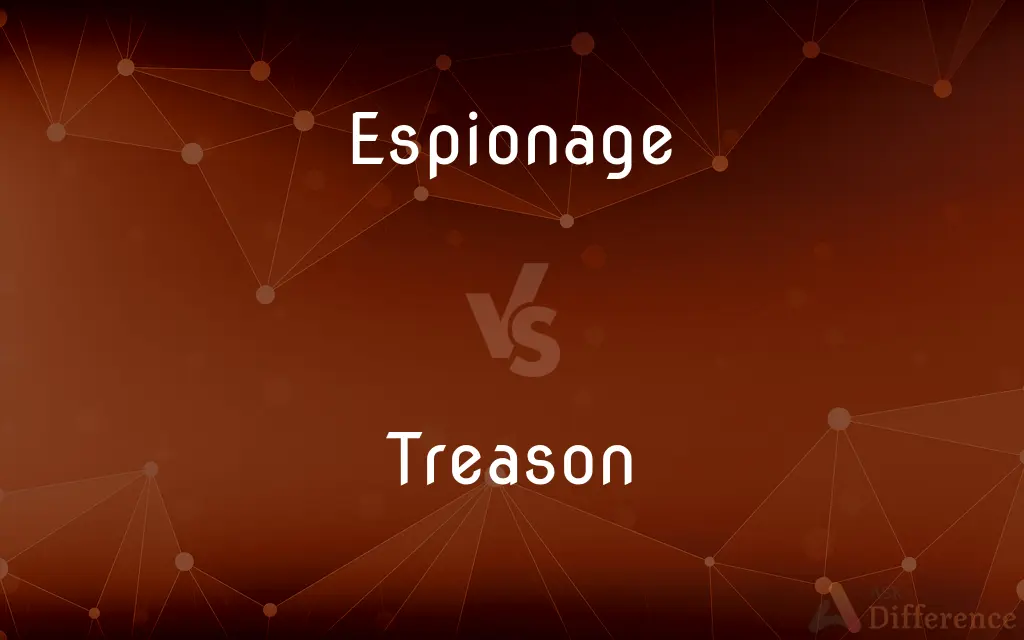Espionage vs. Treason — What's the Difference?
Edited by Tayyaba Rehman — By Fiza Rafique — Updated on October 13, 2023
Espionage involves spying or using spies, typically to gather secret information. Treason is betraying one's country, especially by aiding its enemies or trying to overthrow its government.

Difference Between Espionage and Treason
Table of Contents
ADVERTISEMENT
Key Differences
Espionage is the act of obtaining secret or confidential information without the permission of the holder of the information. It typically involves activities like spying or the use of spies. This secret information can be related to defense, commerce, technology, or any area of strategic interest. Treason, on the other hand, directly deals with acts of betrayal against one's own country, particularly in favor of an opposing nation.
While espionage might not necessarily indicate disloyalty to one's country, treason explicitly does. An individual involved in espionage might be working to gather information for their own nation's benefit. Treason is a much graver offense, as it entails acts that harm or intend to harm one's own nation, such as aiding the enemy during wartime or attempting to overthrow the government.
Espionage can be committed by both nationals of a country and foreigners. A foreign spy working undercover to gather information is committing espionage. Treason, by its nature, is typically an act committed by citizens of the country they're betraying. A citizen providing aid to an enemy nation during war, for example, would be committing treason.
There are legal distinctions as well. In the U.S., for instance, treason is the only crime specifically defined in the Constitution. Conviction requires two witnesses or a confession in open court. Espionage, while also a severe crime, doesn't carry these specific requirements. Both crimes, however, can lead to significant penalties, including the death penalty.
Comparison Chart
Definition
Act of spying or using spies to gather secret information.
Act of betraying one's country, especially by aiding its enemies.
ADVERTISEMENT
Intent
Gather confidential information, not always against one's nation.
Direct betrayal or harm to one's nation.
Commitment
Can be by both nationals and foreigners.
Typically by nationals of the country being betrayed.
Legal Context (U.S.)
Defined by various laws, not explicitly in the Constitution.
Only crime specifically defined in the U.S. Constitution.
Example
Spying on a rival company for trade secrets.
Aiding an enemy nation during wartime.
Compare with Definitions
Espionage
Covert operations to understand an adversary's intentions.
She was arrested for espionage after transmitting classified documents.
Treason
Acts against the sovereignty or safety of one's nation.
Plotting to overthrow the government can be tried as treason.
Espionage
Act of secretly collecting sensitive information.
His espionage activities compromised national security.
Treason
Deliberate actions to undermine one's own country.
Sharing national defense secrets with a hostile nation is an act of treason.
Espionage
Using spies to gather data covertly.
The Cold War was rife with espionage on both sides.
Treason
Betraying one's own country for an adversary.
Assisting the enemy during wartime is considered treason.
Espionage
Clandestine collection of confidential knowledge.
Technological advancements have changed the methods of espionage.
Treason
Loyalty breach toward one's own nation.
He was charged with treason for aiding insurgents.
Espionage
Stealthy surveillance for unauthorized information.
Espionage has been a significant theme in many spy novels.
Treason
Willfully aiding enemies against one's nation.
Collaborating with occupiers during war might be viewed as treason.
Espionage
Espionage or spying is the act of obtaining secret or confidential information from non-disclosed sources or divulging of the same without the permission of the holder of the information. A person who commits espionage is called an espionage agent or spy.
Treason
Treason is the crime of attacking a state authority to which one owes allegiance. This typically includes acts such as participating in a war against one's native country, attempting to overthrow its government, spying on its military, its diplomats, or its secret services for a hostile and foreign power, or attempting to kill its head of state.
Espionage
The practice of spying or of using spies to obtain secret information, especially regarding a government or business.
Treason
The betrayal of allegiance toward one's own country, especially by committing hostile acts against it or aiding its enemies in committing such acts.
Espionage
The act or process of learning secret information through clandestine means.
Treason
The betrayal of someone's trust or confidence.
Espionage
The practice or employment of spies; the practice of watching the words and conduct of others, to make discoveries, as spies or secret emissaries; secret watching.
Treason
The crime of betraying one’s own country.
Espionage
The systematic use of spies to get military or political secrets
Treason
An act of treachery, betrayal of trust or confidence.
Treason
The offense of attempting to overthrow the government of the state to which the offender owes allegiance, or of betraying the state into the hands of a foreign power; disloyalty; treachery.
The treason of the murthering in the bed.
Treason
Loosely, the betrayal of any trust or confidence; treachery; perfidy.
If he be false, she shall his treason see.
Treason
A crime that undermines the offender's government
Treason
Disloyalty by virtue of subversive behavior
Treason
An act of deliberate betrayal
Common Curiosities
What is Espionage?
Espionage involves spying or using spies to gather secret information.
Can a foreigner commit Treason against the U.S.?
Typically, treason is an act committed by citizens against their own country.
What's the penalty for Treason in the U.S.?
The penalties can be severe, including death or imprisonment.
Is corporate Espionage the same as national Espionage?
No, corporate espionage focuses on stealing trade secrets from companies, whereas national espionage targets state secrets.
How does Treason differ from Espionage?
Treason is betraying one's country, especially by aiding its enemies, while espionage focuses on the act of spying or information gathering.
Why is Treason considered such a grave offense?
Treason involves betrayal of one's country and can lead to significant harm to national interests.
Has the digital age changed Espionage?
Yes, with cyber espionage becoming more prevalent as technology evolves.
How does one differentiate between loyalty to country and Treason?
Loyalty involves allegiance and support, while treason is a betrayal of that trust.
Is all Espionage illegal?
Not necessarily; countries often engage in espionage against adversaries, but doing so can breach international norms and treaties.
Can someone be charged with both Treason and Espionage?
Yes, if their actions meet the criteria for both offenses.
How is Treason defined in the U.S. Constitution?
Treason involves levying war against the U.S. or giving aid and comfort to its enemies.
Can Espionage ever be justified?
From a national security perspective, espionage might be seen as necessary, but it's often illegal and can strain diplomatic relations.
Is Espionage always related to government secrets?
No, espionage can also relate to corporate, technological, or other forms of secret information.
Who typically commits Treason?
Citizens of the country they are betraying usually commit treason.
Can whistleblowers be charged with Espionage or Treason?
If they disclose classified information to unauthorized entities, they might face such charges, depending on the context and jurisdiction.
Share Your Discovery

Previous Comparison
Amnion vs. Chorion
Next Comparison
Islam vs. MuslimAuthor Spotlight
Written by
Fiza RafiqueFiza Rafique is a skilled content writer at AskDifference.com, where she meticulously refines and enhances written pieces. Drawing from her vast editorial expertise, Fiza ensures clarity, accuracy, and precision in every article. Passionate about language, she continually seeks to elevate the quality of content for readers worldwide.
Edited by
Tayyaba RehmanTayyaba Rehman is a distinguished writer, currently serving as a primary contributor to askdifference.com. As a researcher in semantics and etymology, Tayyaba's passion for the complexity of languages and their distinctions has found a perfect home on the platform. Tayyaba delves into the intricacies of language, distinguishing between commonly confused words and phrases, thereby providing clarity for readers worldwide.














































